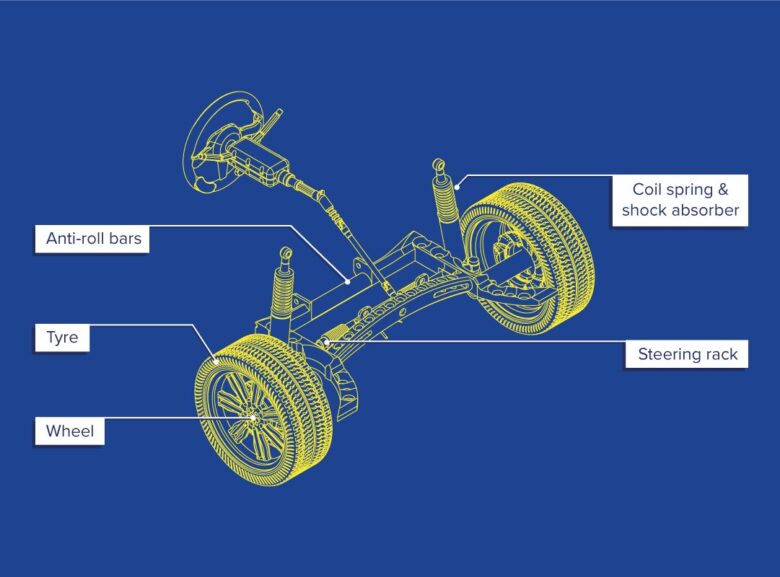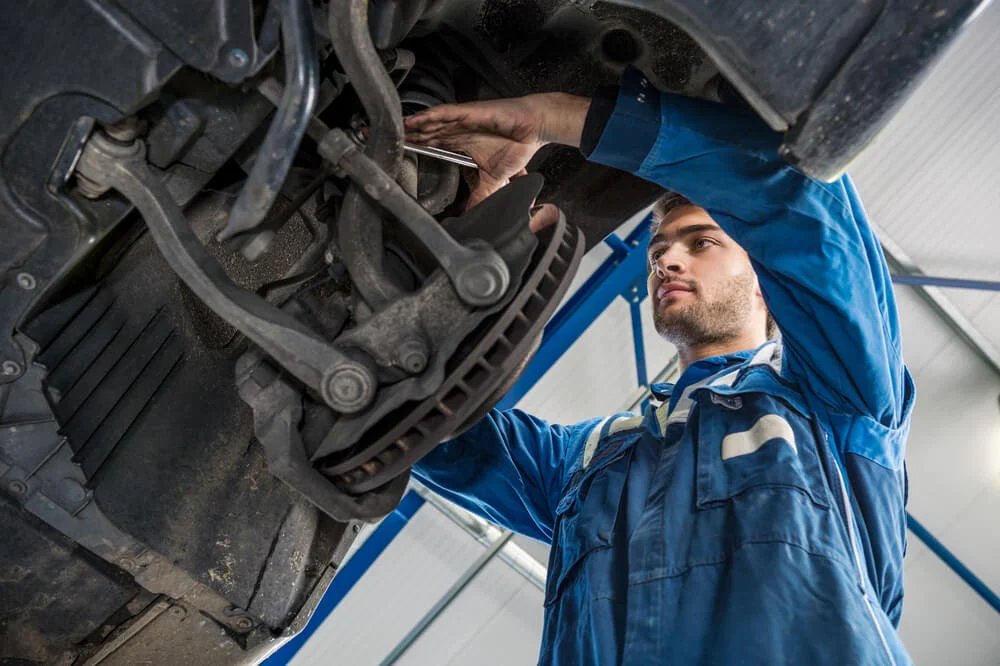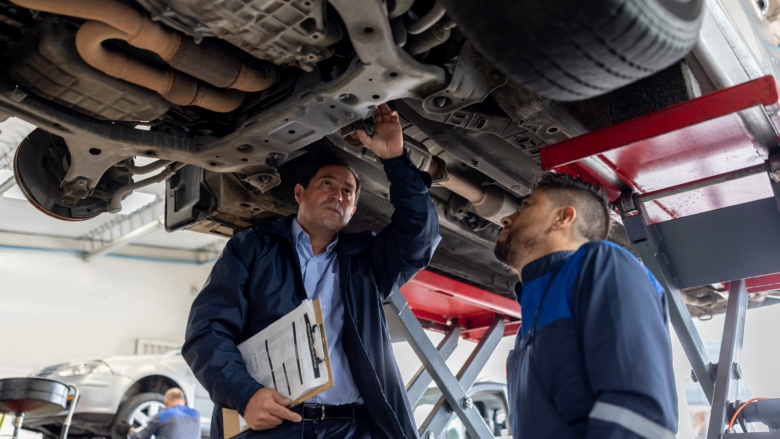Your car’s suspension system operates quietly in the background, ensuring a smooth and secure ride. But just like you, it needs proper care and check-ups. Basic suspension maintenance is vital to responsible car ownership, especially if professional check-ups are unavailable.
If you’re looking for tips on basic suspension maintenance to keep your vehicle in optimal condition, then this guide is perfect for you.
Contents
Understanding Your Car’s Suspension System
Your car’s suspension system is a team of essential components, including shocks, struts, springs, and control arms. Shocks and struts manage the vehicle’s movement, while springs provide support. Control arms link the wheels to the car’s frame. This cohesive effort ensures a smooth and stable ride, with each component vital in maintaining balance.

Source: eurocarparts.com
Importance of Regular Suspension Maintenance
Regular suspension maintenance is the foundation for an efficiently operating vehicle. It extends the lifespan of suspension components, enhances overall safety, and prevents costly repairs. Proactive measures, such as routine checks and fluid maintenance, contribute to a reliable and durable suspension system.
Signs of Suspension Issues
Understanding the signs of potential suspension problems is a sign of responsible car ownership. Identifying these issues early on can save you from more extensive problems and ensure a smoother and safer driving experience. Here are some key signs and what they might indicate:
Uneven Tire Wear
Uneven tire wear is often a visual red flag that something is amiss with your vehicle’s suspension. If you notice that the tread on your tires is wearing unevenly, it could indicate misalignment or worn-out components in the suspension system.
Misaligned wheels can lead to many issues, including compromised handling, reduced fuel efficiency, and increased tire wear. Addressing misalignment promptly not only extends the life of your tires but also contributes to a safer and more efficient driving experience.
Excessive Bouncing or Dipping
If your vehicle feels like it’s bouncing excessively or dipping excessively when you navigate bumps or uneven terrain, it’s likely a sign of failing shocks or struts. Shocks and struts are crucial components that help control your car’s movement, ensuring a stable and comfortable ride.
Failing shocks or struts not only compromises ride comfort but also impacts the stability of your vehicle. This can reduce control, especially during sudden stops or quick maneuvers. Addressing these issues promptly is essential to maintain comfort and safety on the road.
Strange Noises While Driving
Unusual sounds emanating from your vehicle while driving can indicate issues within the suspension system. Clunks, thumps, or creaks may suggest problems with various suspension parts, such as bushings, joints, or even the shocks and struts.
Ignoring strange noises can lead to further damage and potential safety hazards. For instance, worn-out bushings or joints can affect the alignment and handling of your vehicle. Identifying and addressing these noises through professional inspection can prevent more extensive and costly repairs.

Source: byrdautomotive.com
Tips for Basic Suspension Maintenance
Sometimes, professional car check-ups are not available for many reasons, so you will have to do the first check. That’s why it is also important to equip yourself with basic knowledge about maintenance. Here are some tips for basic suspension maintenance that every car owner should know:
Regular Inspection Routine
Perform a visual inspection of the undercarriage, checking for leaks or damage to suspension components. Examine tire condition and alignment to ensure even wear. This routine enables early detection of potential issues, contributing to overall maintenance.
Understanding Suspension Fluids
Suspension fluids serve as the lifeblood of your car’s suspension system. Maintaining proper fluid levels is crucial for optimal performance. Regularly check and top off these fluids to ensure your car stays hydrated, enhancing its longevity and functionality.
Lubrication and Greasing
Your car’s components require proper lubrication. Identify components that require greasing, such as ball joints and bushings. Choosing the right lubricants reduces friction and prevents premature wear, contributing to the overall well-being of your suspension system.
Properly Inflated Tires
Maintaining proper tire pressure is not just about fuel efficiency – it also influences your suspension. Adequately inflated tires ensure uniform contact with the road, contributing to a smoother ride. Regularly check and adjust tire pressure according to your vehicle’s specifications.
Driving Habits and Suspension Wear
Your driving habits significantly impact suspension wear. Avoid aggressive driving, excessive speeding, and abrupt stops. These behaviors unnecessarily strain suspension components, contributing to accelerated wear and tear. Adopting a smoother driving style enhances both your driving experience and the lifespan of your suspension system.

Source: chase.com
When to Visit a Suspension Specialist
While DIY checks are beneficial, professional inspections remain indispensable. The best suspension specialists possess the expertise to diagnose complex issues that may elude amateur inspection. Schedule regular professional checks to supplement your at-home maintenance routine, ensuring a comprehensive approach to suspension care.
Certain signs signal the need for a suspension specialist’s expertise. Persistent or severe suspension issues, unidentified noises, and handling problems warrant professional attention. Additionally, consider your vehicle’s mileage, as older cars may require more frequent checks.
Importance of Timely Expert Assessment
Suspension specialists function as diagnosticians for your vehicle’s well-being. Timely assessments by these experts enable the identification and resolution of intricate issues. This proactive approach prevents potential safety hazards and ensures your vehicle remains in optimal condition.
Recommended Frequency for Specialized Check-ups
Establishing a regular schedule for specialized check-ups is pivotal. While general guidelines suggest annual visits, consider your driving habits and the conditions your vehicle faces. Tailor the frequency of visits to align with your car’s unique needs, creating a personalized maintenance plan.

Source: fzygarage.com
Embrace Smooth Rides, Master Suspension Care!
Remember that your driving habits also contribute to your overall well-being. Gentle maneuvers, avoiding pothole-laden roads when possible, and being mindful of your vehicle’s movements can go a long way in ensuring a consistently smooth ride. So, alongside the practical tips shared here, consider the role of a driver in keeping your car’s suspension in good shape
